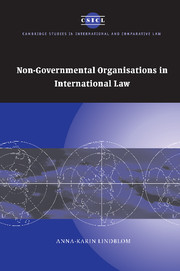Book contents
- Frontmatter
- Contents
- Acknowledgements
- List of abbreviations
- Part I Theoretical framework
- Part II Legal and empirical survey
- 4 Rights and obligations
- 5 Standing before international judicial and quasi-judicial bodies
- 6 Non-party participation before judicial and quasi-judicial bodies
- 7 Co-operation with intergovernmental organisations
- 8 Participation in international conferences
- 9 Agreements with states and intergovernmental organisations
- Part III Conclusion
- Bibliography
- Interviews
- Index
- CAMBRIDGE STUDIES IN INTERNATIONAL AND COMPARATIVE LAW
4 - Rights and obligations
Published online by Cambridge University Press: 12 August 2009
- Frontmatter
- Contents
- Acknowledgements
- List of abbreviations
- Part I Theoretical framework
- Part II Legal and empirical survey
- 4 Rights and obligations
- 5 Standing before international judicial and quasi-judicial bodies
- 6 Non-party participation before judicial and quasi-judicial bodies
- 7 Co-operation with intergovernmental organisations
- 8 Participation in international conferences
- 9 Agreements with states and intergovernmental organisations
- Part III Conclusion
- Bibliography
- Interviews
- Index
- CAMBRIDGE STUDIES IN INTERNATIONAL AND COMPARATIVE LAW
Summary
Theoretical background
The concept of ‘rights’
‘Right’ and ‘obligation’ are not unproblematic as concepts of international law. Because of the interconnectedness of the issue of international rights and obligations pertaining to non-state actors with the issue of the subjects of international law, it is still somewhat controversial to assert that individuals – or, indeed, NGOs – can be bearers of rights or obligations directly under the international legal system. As has been touched upon earlier in this book, there is substantial debate in international legal theory as to the meaning and implications of the concept of ‘right’ as related to non-state actors. Although there is neither room nor need within the framework of the present study for a lengthy description of the different theories and positions put forward in this discussion, a brief analysis of the concept is called for before it is examined to what extent international law does in fact confer rights on NGOs.
A useful starting-point for discussions on the legal rights concept is Professor Wesley Hohfeld's theory, which was first put forward in 1913. In his book, Hohfeld separated eight different aspects of ‘right’ grouped into four pairs, where each termwas defined by its correlative opposite. The two pairs most relevant for the purposes of analysing the position of private entities in international law are right (claim)—duty and power—liability. While admitting that legal relations are sui generis, Hohfeld asserted that his scheme included all possible variations of legal relations.
- Type
- Chapter
- Information
- Non-Governmental Organisations in International Law , pp. 121 - 217Publisher: Cambridge University PressPrint publication year: 2006

